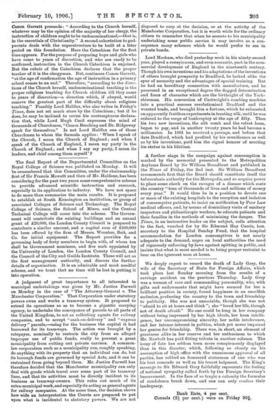A judgment of great importance to all interested in municipal
undertakings was given by Mr. Justice Farwell on Monday in the case of " The Attorney-General v. The Manchester Corporation." That Corporation under statutory powers owns and works a tramway system. It proposed to extend its operations so as to become a gigantic carrying agency, to undertake the conveyance of parcels to all parts of the United Kingdom, to act as collecting agents for railway companies, and to accept " cash-on-delivery " and " express delivery" parcels,—using for the business the capital it had borrowed for its tramways. The action was brought by a ratepayer, nominally to restrain the city from an alleged improper use of public funds, really to prevent a great municipality from cutting out private carriers. A common- law corporation such as a municipality can, roughly speaking, do anything with its property that an individual can do, but its borough funds are governed by special Acts, and it can be restrained from going beyond them. Mr. Justice Farwell has therefore decided that the Manchester municipality can only deal with goods which travel over some part of its tramway lines, and that its activities must be directly incident to its business as tramway-owners. This rules out much of its extra-municipal work, and especially its acting as general agents for railway companies. At the same time, the decision shows how wide an interpretation the Courts are prepared to pat upon what is incidental to statutory powers. We are not disposed to carp at the decision, or at the activity of the Manchester Corporation, but it is worth while for the ordinary citizen to remember that when he assents to his municipality undertaking some public service it may involve as a con- sequence many schemes which he would prefer to see in private hands.










































 Previous page
Previous page